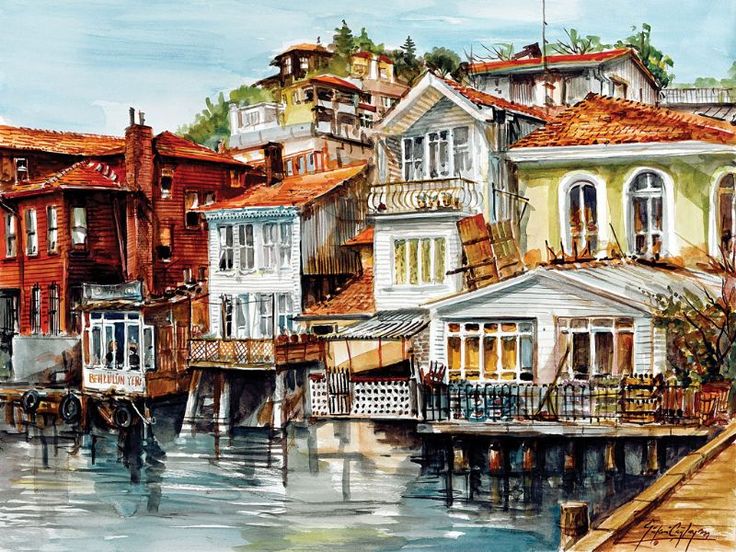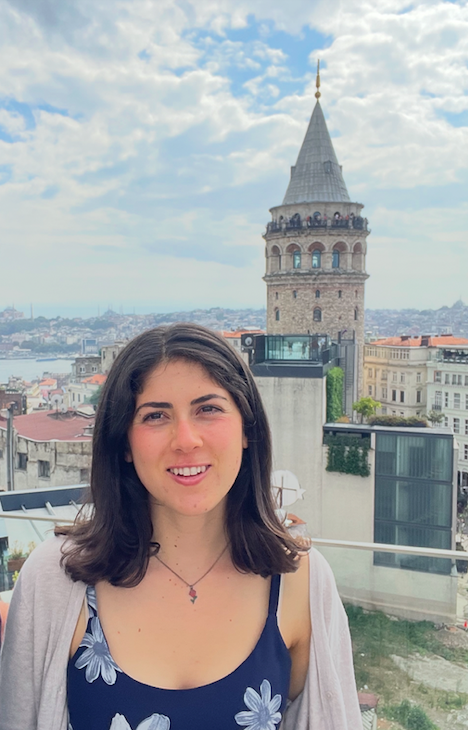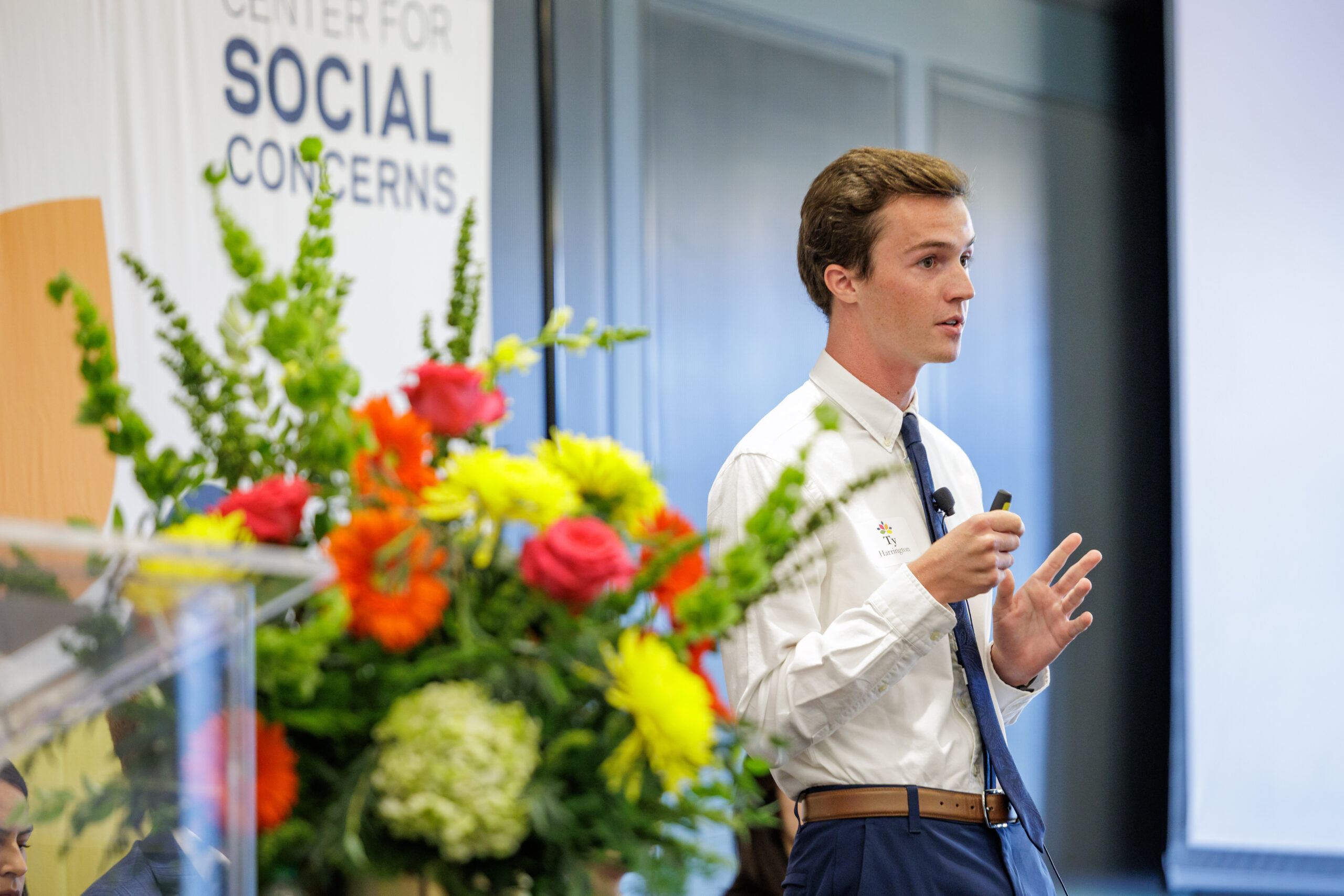Bridging worlds through art
Kyla Walker joins institute as international poetry justice fellow
September 17, 2025
At an early age, Kyla Walker was inspired by the power of art and its ability to draw people together.
Growing up in Los Angeles as a Turkish American, she always viewed Istanbul as a second home. “We would go there every few years to visit my grandparents, uncle, and cousin,” she recalls. But her grandparents couldn’t speak English, and she hadn’t yet learned Turkish. Instead, her grandfather, who was a painter, would sketch pictures on napkins at restaurants for Kyla and her brother. “And so we communicated through sketches,” Kyla remembers. “He would draw his memories for me and my brother, showing us how he saw the world. That was my first foray into art.”

Now as the international justice poetry fellow at the Institute for Social Concerns, Kyla is practicing what she learned from her grandfather as a child—using her art to create understanding and connection across differences of language, culture, and geography.
While still following in her grandfather’s footsteps, Kyla soon realized that she gravitated more towards literature than visual art, as she penned poems, short stories, and song lyrics throughout her adolescence and into adulthood.
Kyla pursued her passion for writing in college, earning a bachelor’s degree in English with a minor in music from Pomona College in Claremont, California, where she worked as a research assistant to the New York Times best-selling author Jonathan Lethem and was taught by the award-winning novelist Mary Gaitskill. While at Pomona, she took fiction workshops with Lethem and Gaitskill and fell in love with the art of writing, sharing her work with peers, and the collaborative editing process that followed. In May, Kyla received her master of fine arts in creative writing from the University of Notre Dame, where she studied under the tutelage of acclaimed novelist Azareen Van Der Vliet Oloomi. All three professors taught her how to read widely and precisely, train her critical eye back onto her own pieces, and be ruthless in revision.
“I’m so grateful to have been guided by writers who I look up to immensely and admire for both their prose and personal integrity. They’ve each been pillars in my life and have taught me so much about the perseverance, curiosity, and devotion that the writing life requires,” Kyla says of her mentors throughout her undergraduate and graduate studies.
“Kyla Walker’s work is mysteriously subtle and quiet,” says Van der Vliet Oloomi, “yet a turbulent, captivating energy vibrates beneath her taut and poised sentences, drawing the reader into a universe where the hard philosophical questions about what it means to be human appear in the most quotidian of details, rendering everything strange and bewitching.”
Kyla’s work has been nominated for a Pushcart Prize and recognized on the 2023 Granum Prize Longlist. Kyla has also been selected as a Tin House Workshop Scholar, Periplus Fellow, Virginia Center for Creative Arts Fellow, and, most recently a Graduate Justice Fellow at the Institute for Social Concerns. The Graduate Justice Fellowship was especially transformative for Kyla, as she encountered incredible cross-disciplinary academics, artists, and scholars—such as Monalisa and Joel Day—who discussed their research on human rights and democracy and unveiled another potential path toward making a global impact, starting right here in South Bend.

“Notre Dame has gifted me with amazing experiences, friendships, and the time and space to grow as an artist,” Kyla says. “I’ve been moved by the people I’ve met here and am even more motivated now to use art and language to amplify peace and connection in our current times.”
Over the past two summers, Kyla has traveled to Portugal, Ireland, and Italy for archival projects while also taking philosophy courses and language classes and translating an early twentieth century, anti-fascist Italian novel. “At Notre Dame, I’ve learned so much through my coursework, conversations, and being able to research abroad, engaging with other cultures,” she says. “It’s expanded my world.”
Throughout college and the Notre Dame MFA program, Kyla completed a manuscript for a novel titled (Middle) Eastern Standard Time. Inspired by her mother’s experience immigrating to the United States from Turkey in 1994, the novel aims to capture and reveal truths about the long history of Islamophobia and xenophobia in the United States and the impact it has had on individuals, while also eradicating the commonly negative stereotypes of Middle Eastern immigrants portrayed in mass media and American pop culture. In doing so, she hopes to bridge cultural divides and create empathy across difference.
“The novel explores the gaps between words and images and how society absorbs one as the other,” Kyla explains. “Engaging language and cinema, it also speaks to the experiences of first generation Americans in the United States and how we relate to our parents’ cultures, even if we often feel stuck between two places or don’t always feel like we fully fit into either.”
For her fellowship at the Institute, Kyla turns from prose to poetry, while still using language to empower those who are stuck between two worlds. As part of her fellowship, she will be collaborating with the Notre Dame English Department and the institute to teach a poetry workshop at the St. Joseph County Jail, the first workshop of its kind for women at the jail.
“My hope is to make it known to these women that there are people who value them as part of our community,” Kyla says. “And I think it is important to connect Notre Dame students, using the excellent education we’ve been given, to support our neighbors’ journeys to reentry and have conversations that help us all understand each other better.”

“Kyla is an incredible multitalented artist,” notes Suzanne Shanahan, the Leo and Arlene Hawk Executive Director of the institute. “We’re so thrilled to have her as our international justice poetry fellow, as we see the arts as integral to the institute’s work of illuminating, understanding, and advancing justice in our communities.”
Kyla’s research interests lie at the intersection of Middle Eastern studies, sociology, anthropology, and the Literatures of Annihilation, Exile, and Resistance program founded by Van der Vliet Oloomi. Guided by the principles of truth and political freedom, her research goals are dedicated to immigrants, refugees, and those from Middle Eastern-American social and racial backgrounds.
Kyla’s non-fiction has been published in the Los Angeles Times and Electric Literature. Writing literature and poetry under the pen name K. D. Walker—which incorporates her Turkish middle name—she has had her work published in Threepenny Review and Cultbytes, and her short story “Tourist Attractions”—about how local teenage girls are perceived by white male tourists in Istanbul—appeared in The Hopkins Review.
This semester at the institute, Kyla will begin research for a prose-poetry book that examines the power of language to provide social, emotional, and financial access, especially for migrants in their new societies. Through the fall, she’ll be conducting research on how specific etymologies and histories affect relationships in the United States and, in the spring, transforming this study into a prose-poetry book that examines the philosophical effects of language and its inflections across time.
“I’m excited for this poetry fellowship and the opportunity to work at the Institute for Social Concerns,” Kyla says. “Geddes Hall is filled with a lovely group of people who are each so passionate and optimistic. The research here is absolutely making the world a better place, and it’s an honor to be a part of it.”
In his inaugural address, Rev. Robert A. Dowd, C.S.C., called on the Notre Dame community to “become the bridge-builders the world needs.” “A Catholic university, according to my predecessor and brother in Holy Cross, Father Ted Hesburgh, ‘should be a bridge across all chasms that separate modern people from each other,’” he said. Through her writing and fellowship at the institute, Kyla is demonstrating how art can build the bridge the world needs.
The International Justice Poetry Fellowship is one of a number of new research fellowships at the institute this fall. Read about all the new scholars who joined the institute for the 2025–26 academic year.
Related Stories
-
ReSearching for the Common Good: Jenifer Guadalupe Solano Becerra
-
Engaging South Bend—University faculty explore research collaborations with regional organizations through institute’s Engage South Bend tour
-
Two paths, one destination—Postbaccalaureate research fellows join the institute to research mass incarceration
-
Extraordinary good for this world—Researching for the Common Good Symposium celebrates undergraduate summer research
-
Social Concerns Summer Fellow returns to India for ongoing research





